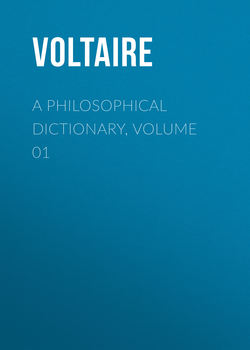Читать книгу A Philosophical Dictionary, Volume 01 - Voltaire, Вольтер - Страница 8
ABUSE OF WORDS
ОглавлениеBooks, like conversation, rarely give us any precise ideas: nothing is so common as to read and converse unprofitably.
We must here repeat what Locke has so strongly urged —Define your terms.
A jurisconsult, in his criminal institute, announces that the non-observance of Sundays and holidays is treason against the Divine Majesty. Treason against the Divine Majesty gives an idea of the most enormous of crimes, and the most dreadful of chastisements. But what constitutes the offence? To have missed vespers? – a thing which may happen to the best man in the world.
In all disputes on liberty, one reasoner generally understands one thing, and his adversary another. A third comes in who understands neither the one nor the other, nor is himself understood. In these disputes, one has in his head the power of acting; a second, the power of willing; a third, the desire of executing; each revolves in his own circle, and they never meet. It is the same with quarrels about grace. Who can understand its nature, its operations, the sufficiency which is not sufficient, and the efficacy which is ineffectual.
The words substantial form were pronounced for two thousand years without suggesting the least notion. For these, plastic natures have been substituted, but still without anything being gained.
A traveller, stopped on his way by a torrent, asks a villager on the opposite bank to show him the ford: "Go to the right!" shouts the countryman. He takes the right and is drowned. The other runs up crying: "Oh! how unfortunate! I did not tell him to go to his right, but to mine!"
The world is full of these misunderstandings. How will a Norwegian, when reading this formula: Servant of the servants of God; discover that it is the Bishop of Bishops, and King of Kings who speaks?
At the time when the "Fragments of Petronius" made a great noise in the literary world, Meibomius, a noted learned man of Lübeck, read in the printed letter of another learned man of Bologna: "We have here an entire Petronius, which I have seen with my own eyes and admired." Habemus hic Petronium integrum, quem vidi meis oculis non sine admiratione. He immediately set out for Italy, hastened to Bologna, went to the librarian Capponi, and asked him if it were true that they had the entire Petronius at Bologna. Capponi answered that it was a fact which had long been public. "Can I see this Petronius? Be so good as to show him to me." "Nothing is more easy," said Capponi. He then took him to the church in which the body of St. Petronius was laid. Meibomius ordered horses and fled.
If the Jesuit Daniel took a warlike abbot, abbatem martialem, for the abbot Martial, a hundred historians have fallen into still greater mistakes. The Jesuit d'Orleans, in his "Revolutions of England," wrote indifferently Northampton or Southampton, only mistaking the north for the south, or vice versa.
Metaphysical terms, taken in their proper sense, have sometimes determined the opinion of twenty nations. Every one knows the metaphor of Isaiah, How hast thou fallen from heaven, thou star which rose in the morning? This discourse was imagined to have been addressed to the devil; and as the Hebrew word answering to the planet Venus was rendered in Latin by the word Lucifer, the devil has ever since been called Lucifer.
Much ridicule has been bestowed on the "Chart of the Tender Passion" by Mdlle. Cuderi. The lovers embark on the river Tendre; they dine at Tendre sur Estime, sup at Tendre sur Inclination, sleep at Tendre sur Désir, find themselves the next morning at Tendre sur Passion, and lastly at Tendre sur Tendre. These ideas may be ridiculous, especially when Clelia, Horatius Cocles, and other rude and austere Romans set out on the voyage; but this geographical chart at least shows us that love has various lodgings, and that the same word does not always signify the same thing. There is a prodigious difference between the love of Tarquin and that of Celadon – between David's love for Jonathan, which was stronger than that of women, and the Abbé Desfontaines' love for little chimney-sweepers.
The most singular instance of this abuse of words – these voluntary equivoques– these misunderstandings which have caused so many quarrels – is the Chinese King-tien. The missionaries having violent disputes about the meaning of this word, the Court of Rome sent a Frenchman, named Maigrot, whom they made the imaginary bishop of a province in China, to adjust the difference. Maigrot did not know a word of Chinese; but the emperor deigned to grant that he should be told what he understood by King-tien. Maigrot would not believe what was told him, but caused the emperor of China to be condemned at Rome!
The abuse of words is an inexhaustible subject. In history, in morality, in jurisprudence, in medicine, but especially in theology, beware of ambiguity.
